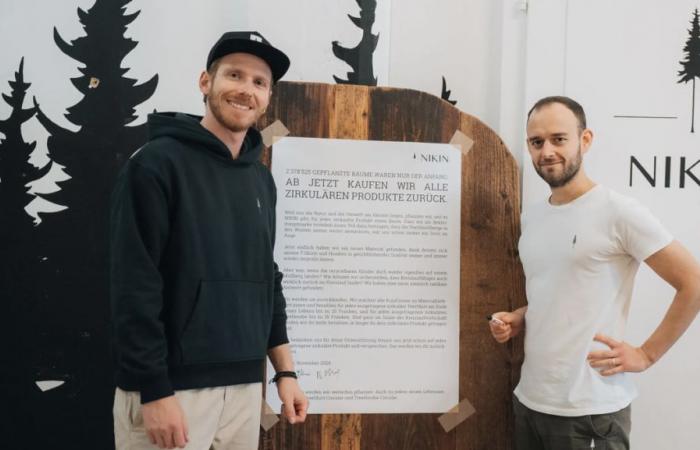The Aargau brand now offers to reimburse biodegradable clothing that is returned to it.Image: dr
The Aargau brand Nikin now reimburses biodegradable clothing that is returned to it. She will recycle them to create new pieces. But the launch of this range does not come without additional costs.
Daniel Vizentini / ch media
Founded in Aargau, Nikin is known for planting trees with every item of clothing sold. Last year, it launched its first biodegradable collection. The clothes are made with a synthetic yarn, naNea from the Bernese company Ocean Safe. Thanks to its particular polymeric structure, it is naturally biodegradable.
Originally, the objective was to recover old clothes to compost them industrially and transform them into biomassused in turn as humus for agriculture. But, in a year and a half, no customer has voluntarily returned a recyclable t-shirt.
Based on this observation, the brand is reviewing its approach: rather than composting, it now seeks to reuse the material to manufacture new items. NaNea yarn retains its properties even after recycling.
To encourage its customers to bring back their clothes, the brand offers them a financial reward: 25% of the sale price in cash (and not in vouchers).
Depreciation over five years maximum
To finance the system, these so-called “circular” garments see their price slightly increased – a sort of deposit on the material. For example, a recyclable item of clothing will cost 79.90 francs instead of 69.90. By returning it, the customer recovers at least the additional 10 francs. Then 2 francs more for each full year of use, up to a maximum of 10 francs after five years. Thus, a customer who paid around 80 francs could recover 20 francs – or the famous 25% of the purchase price.
The longer the garment is worn, the more it will be reimbursed. The model also aims to encourage careful maintenance which extends lifespanbasic principles of the circular economy in short. Nikin, however, sets an accounting limit after five years.
“This allows us to build up provisions and dissolve them after a certain time, in order to avoid any risk of over-indebtedness”
It nevertheless remains possible to extend the return period on request.
Customers are encouraged to return their used clothing, in order to limit waste and recycle raw materials. Each item comes with a prepaid label to cover shipping costs.
Temporary recourse to oil
This new model came into force on 1is last November. Nikin hopes to sell 3,500 items of clothing as part of this program, identifiable by a small circle sewn on the garment and the label. By 2030, the brand aims to only offer recyclable materials.
In the future, Nikin will offer cash for returned biodegradable clothing.Image: dr
“Planting two million trees was just the beginning”
Nicholas Hänny, founder of Nikin
The entrepreneur adds that protecting existing forests benefits the climate more than planting new trees. Just as wearing clothes for extended periods helps reduce waste and save CO2.
However, there remains a downside: naNea, a co-polyester, is currently made from petroleum. Nikin nevertheless presents it as a more ecological alternative to conventional polyester. Ocean Safe is working elsewhere from recycled materials. And in particular thanks to the clothes returned by customers.
More articles on climate
(Translated from German by Valentine Zenker)







